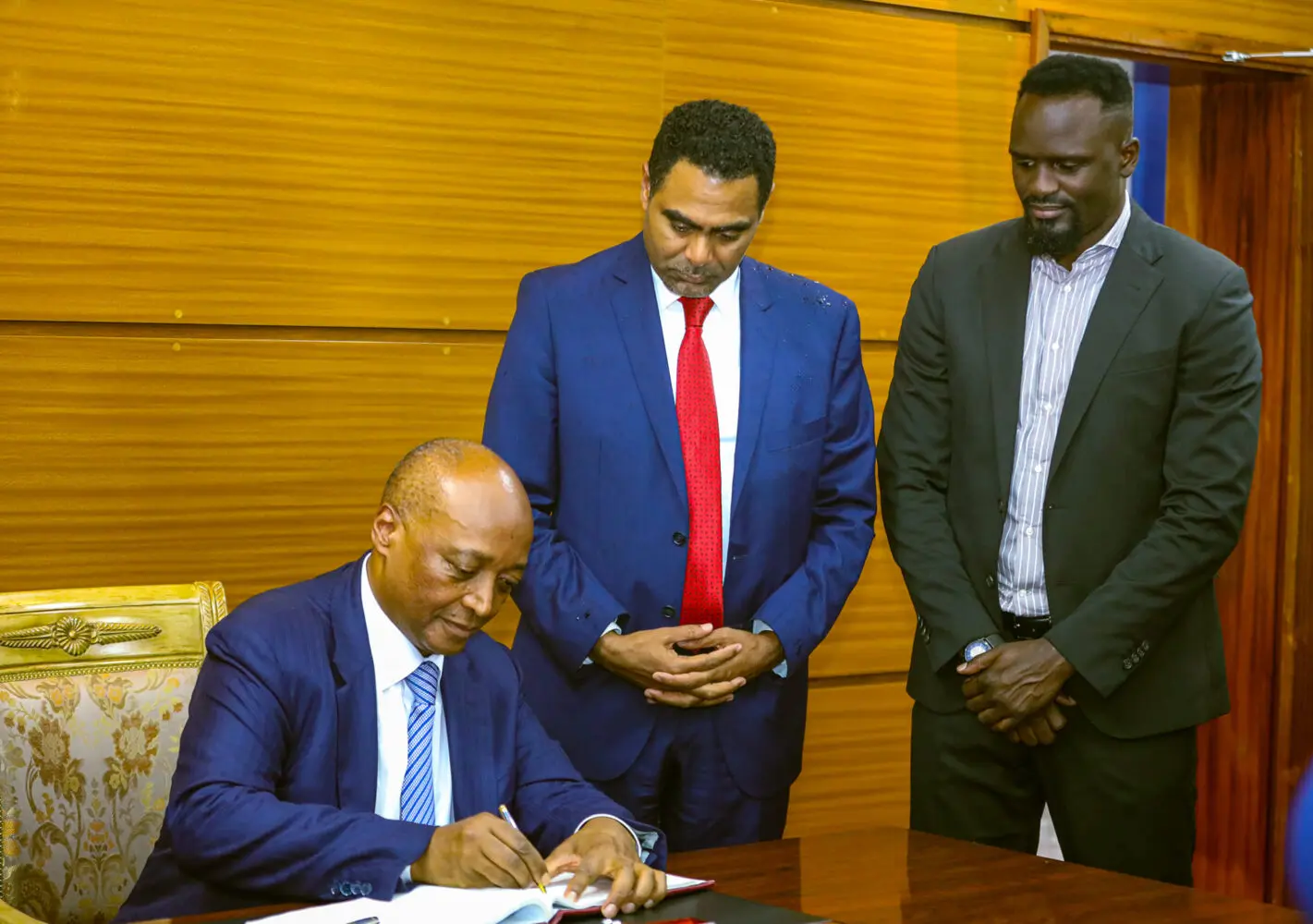CHAN 2024 is delivering drama on the pitch and difficult lessons off it. Kenya’s stirring win over Morocco at a packed Moi International Sports Centre, Kasarani, was eclipsed by scenes of chaos that have now triggered a sweeping intervention by the Confederation of African Football, including fresh fines and a suspension of ticket sales for upcoming fixtures at the venue.
What happened at Kasarani
Hours before kickoff against Morocco on August 10, fans overwhelmed stewards and police at perimeter points, forcing their way into Kasarani. One widely shared video captured a near stampede as supporters battered through a fence, a vivid snapshot of a day when control slipped and protocols unravelled.
Reports from the ground highlighted a troubling list of lapses. Fans without tickets gained entry, the media center was invaded, suspected overcrowding went beyond approved capacity, and tear gas was used inside the stadium despite CAF prohibitions. There was also damage to stadium property, a detail that darkened the glow of a landmark result for the hosts. Kasarani Stadium felt as if the walls were closing in on the people charged with keeping it safe.
Why ticket sales were frozen
In the wake of those incidents, CAF directed the suspension of ticket sales for all remaining CHAN games at Kasarani, including Kenya vs Zambia. The online platform that had announced an evening release later displayed “sold out,” which caused confusion and frustration among fans.
Clarification soon followed. Mozzart Sport established that no tickets had actually been sold. A source explained that CAF had told the vendor to halt sales while the safety and security breaches were reviewed. Mookh Africa, the ticketing partner, confirmed the pause to Nation Sport, saying sales for Kasarani games were suspended until further notice from the organisers.
Fans voice frustration
As the freeze took effect, supporters took to social platforms to question how a match could sell out before tickets went live. Some posts cited confusion on sale times and sudden status changes, using the moment to ask for transparency in the digital process.
TUKO.co.ke highlighted wider concerns about alleged hoarding and resale at inflated prices, and cases of duplicate tickets that failed at gates once one copy was used. The frustrations that boiled over outside, especially before Morocco, were a combustible mix of passion and poor process. Ticket sales at Nyayo Stadium fixtures remained visible on the vendor site while Kasarani listings vanished.
A pattern that worries CAF
The Morocco flashpoint was not an isolated failure. It marked the third consecutive match with significant incidents at Kasarani, a worrying pattern CAF is now treating with urgency. Days earlier during the 1-1 draw with Angola, CAF sanctioned the Football Kenya Federation for letting in fans without tickets, mishandling VIP and VVIP areas, and allowing flares in the stands.
The opening fixture against DR Congo had already raised red flags. CAF’s Disciplinary Board charged FKF with breaches of Articles 82 and 83 of the Disciplinary Code and Articles 15, 31, and 32 of the Safety and Security Regulations, underlining a series of crowd and access failures. CAF expects a higher standard from hosts, especially during a showpiece tournament drawing regional attention.
What CAF has punished so far
- For Kenya vs DR Congo, fines of USD 5,000 for stampede and unauthorised access were imposed,
- an additional USD 10,000 was levied for assault on CAF personnel and guests,
- and a warning was issued over the ignition of fire inside the stadium.
In a separate ruling tied to a CHAN fixture between Morocco and Angola, FKF was fined USD 5,000, with USD 2,500 suspended on condition of future compliance for the remainder of the tournament. After the Angola draw in Nairobi, CAF issued penalties of KSh 1 million for admitting fans without tickets, KSh 650,000 for mishandling VIP and VVIP areas, and KSh 130,000 for flares. FKF will also settle a previously suspended fine of KSh 325,000 for offences during the earlier group match against DR Congo.
Nation reporting placed the cumulative punishment at Sh2.5 million, payable within 60 days, and cited an additional suspended fine of Sh258,600. TUKO.co.ke separately reported that for the Angola-related violations Kenya was expected to pay KSh 1.78 million. The direction of travel is clear, the bills are mounting and the scrutiny is intensifying.
Opening day security report paints a stark picture
Details from the CAF Security Officer’s report on the DR Congo match described a stampede at entry Gate 11. A motorbike was observed weaving through the crowd, and fans lit fires behind the stands at Block 18, each incident chipping away at the baseline of safety.
Worse still, CAF staff and protocol officers were denied access to the VVIP area by State Security, with the incident extending to a member of the South African President’s Close Protection Unit. There were also allegations of an assault on a CAF commercial staff member and a sponsor representative by a private security guard. VVIP access disputes and assaults pierce the core of tournament operations where clear hierarchies and procedures must be respected.
| CASINO | BONUS | INFO | RATING | |
|---|---|---|---|---|
|
bonus
First Bonus: 200% Deposit Bonus
See 3 Bonuses
|
info
8048/JAZ2024-001 HunnyPlay is licensed under Curaçao (365/JAZ). Join now and win crypto instantly! |
|||
|
bonus
New players get 50 free spins and a Ksh 2500 freebet!
See 7 Bonuses
|
info
BK 0000665 PG 0000405 Good combination of online casino and betting platform |
|||
|
bonus
Win Ksh 30,000 daily in Aviator tournament!
See 8 Bonuses
|
info
20+ software providers, Aviator+ other crash games, BK 0000671 PG 0000428 |
|||
|
bonus
Claim weekly freebet codes on Telegram!
See 5 Bonuses
|
info
6,000+ casino games, renowned providers, mobile-optimized gamesBK 0000761, PG 0000461 |
The Kasarani flashpoints before Morocco
On the day Kenya shocked Morocco with a single goal, the crush outside was a storyline of its own. Fans overpowered security and surged over walls and barricades, desperate to be inside for a game of rare magnitude.
The safety breaches included broken gates, media center intrusion and suspected overcrowding. The use of tear gas inside a venue under CAF regulations is an explicit no, a misstep that will draw sharp disciplinary attention. Overcrowding and ventilation concerns turn emotional highs into volatile risk.
What the rules say
CAF’s Safety and Security framework is explicit about ticketing and capacity. Article 15 requires verification of valid tickets before admission with no exceptions. The provisions are designed to be binary, either a ticket is valid or it is not, because ambiguity at gates is where congestion becomes danger.
“Spectators’ entry into the stadium shall be granted on the basis of ticket presentation by the spectator. It is forbidden under this regulation for spectators to be allowed to access the stadium without tickets.”
Article 13 addresses maximum safe capacity, noting that overcrowded stadia contribute to serious injuries and fatalities which CAF finds unacceptable. These are rules written in the ink of football’s hardest lessons, and they exist to protect the very people whose passion gives the game its power. Safety regulations are not suggestions, they are obligations.
The human side of a logistical failure
Kenya’s supporters turned out in huge numbers and their energy lifted the Harambee Stars to a landmark result. Yet the same passion, when funneled into clogged gates and murky ticketing practices, can turn combustible.
TUKO.co.ke reported widespread claims of ticket hoarding, resale at higher prices and duplicated passes that failed at entry points. When honest fans feel shut out by broken systems, the temptation to force a way in rises. Supporters deserve clarity, fairness and confidence that if they follow the rules, they will be treated with respect.
What it means for Kenya and the tournament
Multiple breaches across consecutive matches create the risk of more severe sanctions. TUKO.co.ke noted that continued failures could even threaten Kenya’s Africa Cup of Nations 2027 hosting rights, a potential consequence that underscores the stakes of getting this right quickly.
On the pitch, the story is brighter. Ryan Ogam’s first-half strike stunned Morocco and Kenya now need only a point against Zambia to secure progression. The focus for Benni McCarthy’s side is to finish top and stay in Nairobi for the quarter-finals, a goal that will require off-field calm to match on-field grit. Kenya vs Zambia remains the pivot on which Group A could turn.
LOC urges discipline and compliance
Local Organising Committee chairman Nicholas Musonye urged Kenyans to follow regulations to avoid further penalties. He noted that the money at stake could support the team and volunteers, calling for adherence to CAF guidelines and bans on items such as vuvuzelas.
Asked why fans could not purchase tickets online, Musonye said he had convened a meeting on the matter and would issue a response later. As for ticket vendors, the message was unambiguous, after the Kasarani breach, sales were suspended for games at the venue until clearance is granted. LOC leadership has placed compliance front and center.
What must change before Kenya face Zambia
There is still time to correct course. The issues that plagued recent fixtures are solvable with tighter coordination, transparent ticketing and decisive matchday control.
- Harden the perimeter and resolve choke points with disciplined ingress and egress lanes,
- authenticate tickets with clear verification flows to eliminate duplicates and scalping,
- reconfigure VIP and media access so that credentials and chain of command are unquestioned.
CAF’s Disciplinary Committee is expected to deliberate on the incidents from the Morocco game this week, with financial penalties likely. The costs of failure are growing, but so are the opportunities to show that Kenya can meet the standards of a modern continental tournament. Disciplinary action will be one part of the story, the response will define the rest.
Why this matters beyond one stadium
Nyayo Stadium fixtures remain available on the ticketing site, a reminder that different venues can operate under the same pressures with different outcomes. That is the blueprint Kasarani must quickly emulate, apply the rules, protect the people, deliver the football.
In the coming days, Kenya will chase a quarter-final berth that felt improbable when the draw was made. The roar of a safe, properly managed crowd can propel a team to places maps do not show. Harambee Stars have earned the right to dream, now organisers must earn the right to host them without fear.
The competitive heartbeat and the safety imperative
Football is theatre and obligation, magic and maintenance. Kenya’s victory over Morocco belongs in the former, the breaches that followed land squarely in the latter.
CHAN 2024 can still be remembered for Kenya’s resilience and organisation, a tournament that tested capacities and sharpened standards. The next 72 hours will tell us if hard lessons have been learned, and whether the sport’s guardians can match the bravery of those who play it. CAF oversight will be watching, the fans will be waiting, and the game needs both to believe again.










